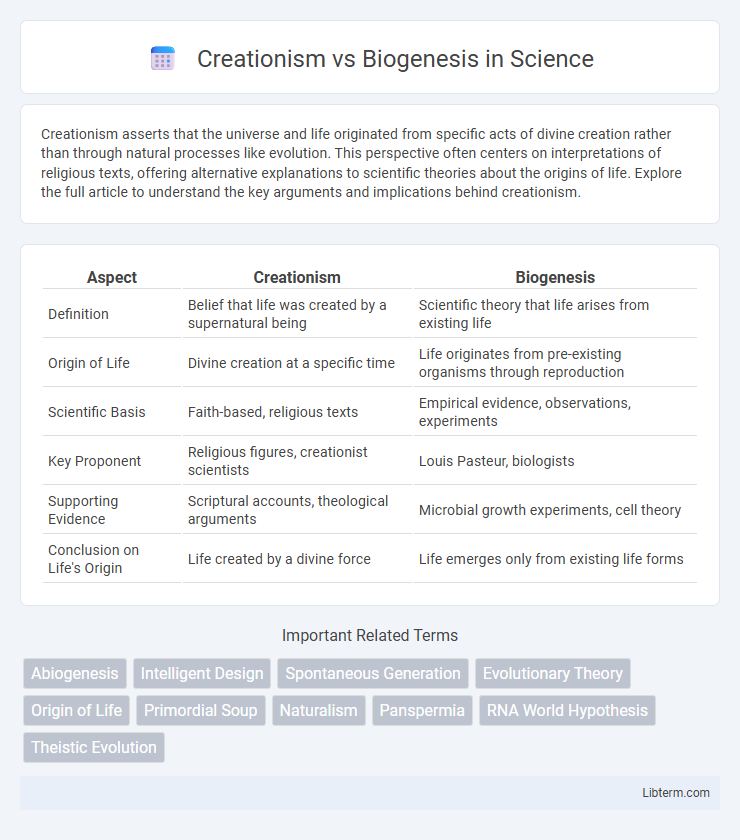Creationism asserts that the universe and life originated from specific acts of divine creation rather than through natural processes like evolution. This perspective often centers on interpretations of religious texts, offering alternative explanations to scientific theories about the origins of life. Explore the full article to understand the key arguments and implications behind creationism.
Table of Comparison
| Aspect | Creationism | Biogenesis |
|---|---|---|
| Definition | Belief that life was created by a supernatural being | Scientific theory that life arises from existing life |
| Origin of Life | Divine creation at a specific time | Life originates from pre-existing organisms through reproduction |
| Scientific Basis | Faith-based, religious texts | Empirical evidence, observations, experiments |
| Key Proponent | Religious figures, creationist scientists | Louis Pasteur, biologists |
| Supporting Evidence | Scriptural accounts, theological arguments | Microbial growth experiments, cell theory |
| Conclusion on Life's Origin | Life created by a divine force | Life emerges only from existing life forms |
Introduction to Creationism and Biogenesis
Creationism posits that life originates from a divine creator, emphasizing supernatural intervention as the source of all living beings, rooted in religious texts and faith-based beliefs. Biogenesis asserts that life arises from pre-existing life through natural biological processes, supported by scientific experiments such as Louis Pasteur's work disproving spontaneous generation. The fundamental distinction lies in creationism's reliance on metaphysical explanations versus biogenesis's foundation in empirical evidence and cellular reproduction mechanisms.
Historical Perspectives on the Origins of Life
Creationism, rooted in religious and cultural traditions, posits that life originates from a divine creator as described in sacred texts, shaping historical worldviews for centuries. Biogenesis, emerging from 19th-century scientific inquiry, asserts that life arises only from preexisting life, challenging spontaneous generation theories and laying the foundation for modern microbiology. Key figures like Louis Pasteur experimentally refuted abiogenesis, reinforcing biogenesis and transforming understanding of life's origins in scientific history.
Core Principles of Creationism
Creationism centers on the core principle that life originated from specific acts of divine creation, rejecting naturalistic explanations like biogenesis that attribute life's emergence to spontaneous processes. It emphasizes the belief in a purposeful and intelligent designer responsible for the complexity and diversity of life, often drawing on religious texts as authoritative accounts of origins. This viewpoint contrasts sharply with biogenesis, which supports the idea that life arises from pre-existing life through natural processes like reproduction and evolution.
Scientific Foundations of Biogenesis
Biogenesis, a fundamental principle in biology, asserts that living organisms arise only from pre-existing life, supported by extensive experimental evidence such as Louis Pasteur's swan-neck flask experiment which refuted spontaneous generation. This scientific foundation emphasizes cell theory, stating that all cells derive from existing cells through processes like mitosis and meiosis, reinforcing the continuity of life. Contrasting with creationism, biogenesis is grounded in empirical observations and reproducible experiments underpinning modern understandings of life's origins.
Key Differences Between Creationism and Biogenesis
Creationism posits that life originated from a divine or supernatural force, often relying on religious texts as foundational evidence, whereas biogenesis asserts that life arises only from pre-existing life through natural biological processes, supported by scientific experiments like Louis Pasteur's swan-neck flask experiment. Creationism emphasizes a unique creation event with purpose-driven design, contrasting with biogenesis's reliance on observable, repeatable natural mechanisms explaining reproduction and cellular development. The key difference lies in creationism's theological framework versus biogenesis's empirical basis grounded in microbiology and evolutionary biology.
Major Arguments in Favor of Creationism
Creationism argues that life originates from an intelligent designer rather than natural processes, emphasizing the complexity and specificity of biological structures as evidence against random evolutionary changes. Proponents highlight gaps in the fossil record and the improbability of life emerging spontaneously through biogenesis to challenge naturalistic explanations. The concept of irreducible complexity, where certain biological systems cannot function if missing parts, is central to creationist claims affirming purposeful design.
Evidence and Support for Biogenesis
Biogenesis is supported by extensive experimental evidence demonstrating that life arises only from pre-existing life, as established by Louis Pasteur's swan-neck flask experiments disproving spontaneous generation. Modern microbiology confirms cellular reproduction as the cornerstone of life propagation, reinforcing biogenesis through genetic continuity and cellular division. Molecular biology's analysis of DNA replication and protein synthesis provides concrete mechanisms that underlie biogenesis, validating the principle that living organisms originate exclusively from other living organisms.
Common Misconceptions and Debates
Creationism is often misunderstood as a purely religious belief lacking scientific basis, while biogenesis--the idea that life arises from existing life--is widely supported by empirical evidence in biology. Common misconceptions include the false equivalence of creationism with evolution or spontaneous generation, whereas biogenesis underpins the scientific consensus on life's origins through reproduction and cellular processes. Debates frequently center on educational curricula and the interpretation of fossil records, with biogenesis promoting the continuity of life and creationism emphasizing divine intervention.
Implications for Science and Education
Creationism challenges the scientific consensus by promoting supernatural explanations for life's origin, impacting science education by encouraging alternative curricula that often conflict with evolutionary theory. Biogenesis, supported by empirical evidence, asserts that life arises from existing life through natural processes, reinforcing foundational biological principles in research and teaching. The debate influences educational standards and public understanding of science, affecting curriculum policies and the acceptance of scientific methodologies in classrooms worldwide.
Conclusion: Evaluating the Origins of Life Debate
Creationism posits that life originates from a divine creator, emphasizing purpose and design, while biogenesis is grounded in scientific evidence showing life arises from existing life through natural processes. Modern research in molecular biology and genetics strengthens biogenesis by demonstrating cellular replication and evolution, challenging creationist claims. The debate ultimately centers on interpreting empirical data versus faith-based belief systems when explaining the origins of life.
Creationism Infographic

 libterm.com
libterm.com